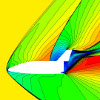Scientific Computing and Numerics (SCAN) Seminar
Disperse particle-laden flows are common in many environmental and industrial applications, and are often turbulent. Some examples include liquid-solid slurry pipelines, underwater sediment transport, fuel spray injection, and fluidized bed reactors. Due to the intricate coupling between granular mechanics and turbulence, understanding and modeling such flows present a significant challenge. In this talk, we will first present a computational framework for conducting highly resolved Euler-Lagrange simulations based on explicit volume filtering. We will show that this framework is appropriate to use in both dilute and dense particle-laden flows by comparing simulation results to available experimental data for a wide variety of flow conditions. We will then turn our attention to particle clustering by focusing on flows where a strong coupling between the phases leads to spontaneous generation of concentration inhomogeneity. Sustained concentration and velocity fluctuations caused by the clusters result in the production of fluid-phase turbulent kinetic energy, referred to as cluster-induced turbulence (CIT). A canonical flow configuration for studying CIT will be presented, followed by an analysis of the fluid-particle dynamics. In particular, we will show that by using a well-designed adaptive filter, it is possible to accurately decompose the total fluctuating energy of the particle phase into correlated and uncorrelated components, which correspond, respectively, to the particle-phase turbulent kinetic energy and the mean granular temperature, allowing us to show for example that the granular pressure is highly anisotropic.
